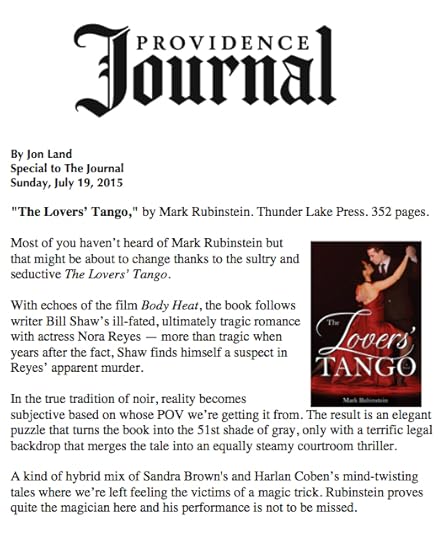Mark Rubinstein's Blog, page 15
August 26, 2015
“X,” A Conversation with Sue Grafton
Sue Grafton is best known for her alphabet mystery series (A is for Alibi, etc.), with her feisty protagonist Kinsey Millhone. NPR’s Maureen Corrigan said the forthcoming conclusion of the alphabet series “makes me wish there were more than twenty-six letters at her disposal.”
Sue has won nearly every award in the crime-mystery lexicon, and her bestselling novels are published in 28 countries and in 26 languages.
Breaking with the tradition of summing up each novel’s storyline by use of a let...
August 22, 2015
Psychology In Fiction
Over the last few years, I’ve been writing fiction. For decades, I’ve been a psychiatrist. A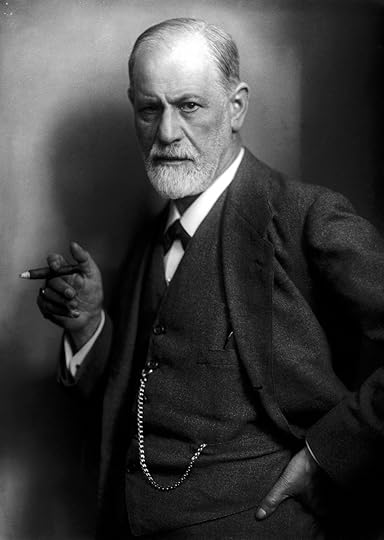 s a novelist, I now write with a reader’s sensibility, and read with a writer’s eye. I’m struck by the degree to which fiction and psychology share certain crucial elements.
s a novelist, I now write with a reader’s sensibility, and read with a writer’s eye. I’m struck by the degree to which fiction and psychology share certain crucial elements.
Human functioning can be conceptualized as involving thinking, feeling, and behavior. These three elements are the very pillars of being.
Fiction taps into these foundations of existence by using the written word to evoke mental im...
August 19, 2015
Psychology in Fiction
Human functioning can be conceptualized as involving thinking, feeling, and behavior. These three elements are the very pillars of being.
Fiction taps into these foundations of existence by using the written word to evoke mental images, which in turn, beget thoughts and feelings. A novelist creates a world for the reader to enter, and to which the reader relates. This is the essence of storytelling.
If the connection is a positive one, the reader is drawn into the tale. The reader must relate to the story’s protagonist for the read to be enjoyable. It’s somewhat akin to meeting a person for the first time. If there’s chemistry, a relationship begins.
To fall under the novelist’s “spell”, the reader must experience and relate to how the protagonist thinks, feels, and behaves. Without that connection, there’s little motivation to continue the relationship. The book is cast aside.
The element of plot is important. But, if the character’s thoughts, feelings, or behaviors are vapid, the plot is nothing more than a linear series of events with little meaning.
So, the first questions a writer must answer are: who is this character, and why should a reader care about what befalls the person? To put it bluntly, character counts. It’s nearly everything. Essentially, the psychology of fiction is the psychology of life. The reader must care about the character for the novel to strike a responsive chord. The goal is to immerse the reader into the commonality of life experience, establishing oneness with the protagonist’s thoughts, feelings, and situation.
Think about the tsunami of some years ago. In that disaster, 250,000 people lost their lives within the span of a few hours. While we were horrified by the magnitude of the event, most of us went about our day, as usual. But, if one person who died had been a loved one, our reactions would have been profoundly different.
Caring about someone counts. Very deeply.
While all people are different, in some respects, we share the same cognitive and emotional repertoires. We all can feel horror, fear, lust, humor, anger, guilt, love, hate, and every other emotional variant. And when we pick up a novel, we want to experience the mental and emotional lives of the characters, living vicariously through them.
Think of today’s bestsellers, those that remain at the top of the charts for many weeks or months. They all have thought-provoking characters who rivet us. In Gone Girl, Nick and Amy Dunne capture us with their marital difficulties and myopically self-serving distortions. The Goldfinch focuses on Theo Decker, a troubled youngster struggling with the loss of his mother, dealing with a remote father, and trying to find his way through a duplicitous world. Whether it’s All the Light We Cannot See, or The Nightingale, each story plumbs the pillars of existence: how and why the characters think, feel, and behave as they do.
This is true for all fiction, whether it’s literary, romance, sci-fi, thrillers, mysteries, or any other genre. Whether you’re reading Stephen King’s Mr. Mercedes and rooting for Bill Hodges; Don Winslow’s The Cartel, worrying about Art Keller; a Harry Bosch novel by Michael Connelly; David Morrell’s stunning Victorian novel, Inspector of the Dead, where Thomas De Quincey works Sherlockian magic; Jon Land’s Strong Darkness, featuring Caitlin Strong; or any Linda Fairstein novel with Alex Cooper—the protagonist’s character is crucial. It marries the reader to the novel. And, that connection can linger long after the book has been read.
Psychology is everything in life, and in fiction.
Mark Rubinstein’s latest novel is The Lovers’ Tango
August 11, 2015
‘Devil’s Bridge,’ A Conversation with Linda Fairstein
For more than 20 years, Linda Fairstein was a prosecutor and Chief of the Sex Crimes Unit o f the Manhattan District Attorney’s office. She’s considered America’s foremost legal expert on sexual assault and domestic violence.
f the Manhattan District Attorney’s office. She’s considered America’s foremost legal expert on sexual assault and domestic violence.
When she turned her talents and impressive background to writing novels, Linda created Prosecutor Alex Cooper, and her team of attorneys and police officers, including Detective Mike Cooper. Their exploits in 16 previous novels have made Linda’s books international bestse...
August 6, 2015
‘Broken Promise,’ A Conversation with Linwood Barclay
Linwood Barclay’s thrillers have been international bestsellers. Trust Your Eyes, an intri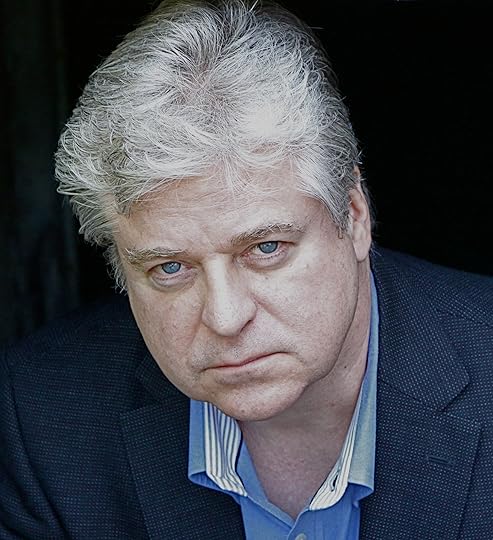 guing novel with a unique premise, has been optioned for film. The Associated Press said, “Linwood Barclay has established himself alongside the masters of suburban fiction.”
guing novel with a unique premise, has been optioned for film. The Associated Press said, “Linwood Barclay has established himself alongside the masters of suburban fiction.”
In just-released Broken Promise, unemployed journalist David Harwood, grieving his wife’s untimely death, moves with his young son back to his parents’ home in Promise Falls, New York. One morning, David visits his cousin Marla, who...
July 31, 2015
‘Brushback,’ A Conversation with Sara Paretsky
Sara Paretsky is the award-winning author of the V. I. Warshawski detective novels. In 1982, when Sara wrote Indemnity Only, she revolutionized the mystery novel by creating a hard-boile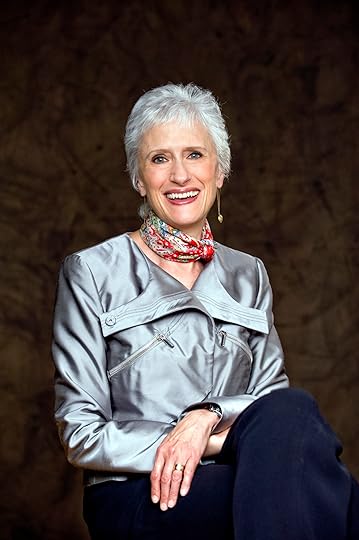 d woman investigator.
d woman investigator.
Growing up in rural Kansas, Sara came to Chicago in 1966 to do community service work in the neighborhood where Martin Luther King was organizing. Sara felt that summer changed her life; and after finishing her undergraduate degree at the University of Kansas, she returned to make Chicago...
July 19, 2015
“The Lovers’ Tango” Gets a Superb Review from The Providence Journal
July 14, 2015
‘The Fraud,’ A Conversation with Brad Parks
Brad Parks is the only author to have won crime fiction’s Shames, Nero, and Lefty Awards. As in his five previous novels, his protagonist, Carter Ross, is an investigative reporter for Newark’s Eagle-Examiner.
As in his five previous novels, his protagonist, Carter Ross, is an investigative reporter for Newark’s Eagle-Examiner.
In The Fraud, a rash of carjackings is terrorizing Newark. When one theft results in the murder of a banking executive, Ross begins investigating the case. He soon learns that a Nigerian immigrant was also killed in another carjacking only days apart from the executive’s murder. Carter...
July 7, 2015
‘Bull Mountain,’ A Conversation with Brian Panowich
Brian Panowich is a firefighter and former musician. As an army brat, he grew up in E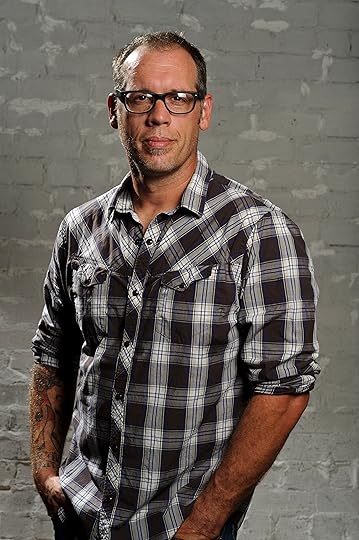 urope until the family settled in East Georgia. His debut novel, Bull Mountain, has received extensive praise from James Ellroy, C.J. Box, Wiley Cash, John Connolly, among others.
urope until the family settled in East Georgia. His debut novel, Bull Mountain, has received extensive praise from James Ellroy, C.J. Box, Wiley Cash, John Connolly, among others.
Bull Mountain is set in the backwoods Georgia hills and spans the decades between the 1940s and today. This story of multigenerational crime and retribution is told from multiple points of view; and the acts of vengeance that have k...
June 29, 2015
Great Opening Lines
“My wound is geography. It is also my anchorage, my port of call.”
—The Prince of Tides by Pat Conroy
“His name was Rambo, and he was just some nothing kid for all anybody knew, standing by the pump of a gas station at the outskirts of Madison, Kentucky. He had a long heavy beard, and his hair was hanging down over his ears to his neck, and he had his hand out trying to thumb a ride from a car that was stopped at the pump. To see him there, leaning on one hip, a Coke bottle in his hand and a...

